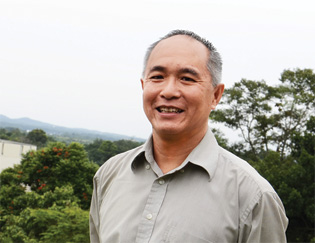Young Children’s Voices in Mathematical Problem Solving
Contributed by Dr Ho Siew Yin and Sng Wei Qin Abbie, from NTUC First Campus, for SingTeach Virtual […]
Read More
If technology can replace the human teacher, does that make the teacher obsolete? Certainly not, says Dr Ang Keng Cheng, who believes that being a good Math teacher is more than just functions and formulae.
“Love Math and love teaching Math”. That is what makes a good Math teacher, according to Associate Professor Ang Keng Cheng, who heads NIE’s Mathematics and Mathematics Education (MME) Academic Group.
 It goes without saying that we expect our Math teachers to have mastery of mathematical content knowledge. But content alone is not enough, says Dr Ang. A good teacher needs good “pedagogical sense”.
It goes without saying that we expect our Math teachers to have mastery of mathematical content knowledge. But content alone is not enough, says Dr Ang. A good teacher needs good “pedagogical sense”.
“Teachers need to balance content mastery with the craft skills in pedagogy. Having the pedagogical skills to go with the content mastery will add a lot more value to a classroom teacher.”
Adding value to students’ lives remains fundamental, despite the many new challenges we’ve seen in the classroom. One of the challenges has come in the form of technology, which has also made students more savvy in many ways.
But Dr Ang reminds us that the role of the teacher hasn’t changed: It is always to facilitate and motivate learning. While technology has made it easier for students to access information on their own, it has also reinforced the need for teachers.
“The fact that the technology can deliver the content doesn’t mean that the learner can learn,” he says. “Learning can be, at times, a complex and dynamic process.”
“For different people, learning is different. The teacher is in a better position to assess these differences, compared to any form of technology. It is difficult to have a one-size-fits-all computer software to facilitate learning.”
For Dr Ang, who started out as a Math teacher in the 1980s, there is more to teaching Math. For him, what intrigued him to teach was the way Math could be applied to solve real-life problems.
– Assoc Prof Ang Keng Cheng, Mathematics and Mathematics Education Academic Group
“It has always been my personal wish to see teachers not only talk about formulae, algorithms and methods, but to also explain mathematical concepts, and how they can be used in real life.”
Making Math come alive has become all the more relevant to 21st century teaching. These days, a teacher has to do more than just teach content knowledge – we need to impart values and skills.
And there are a lot of values in the teaching of Math, says Dr Ang. He calls this a “hidden curriculum” in the training of Math teachers.
“We have been doing these things, for example, building character and developing perseverance. We put our trainees in a situation where they have to solve problems, and it takes time. This builds perseverance. This is part of the value system a person has to have in order to be successful in doing Math.”
For all pre-service teachers, MME’s aim is to make sure our Math teachers are “functional” and able to “hit the ground running” from the day they step into a classroom.
But unlike their subject, there is no standard formula that determines success for Math teachers. Dr Ang goes back to the basics: “A good Math teacher should have passion for both the subject and for teaching children.”
Dr Ang stresses the importance of continual learning and hard work in all this. “If one were to just sit down, do routine work and the bare minimum, there is little hope that one will do well.”
“If you think you are lacking in some areas, you will make the effort to make up for it if you are really passionate about it,” he adds. “When you are passionate about teaching, you would want to do well and other things will naturally fall into place.”
Looking on the bright side, Dr Ang says, “It is exciting in a sense, that the teachers’ job is no longer routine. That may be the perception in the past, but not anymore.”